- Home
- Don DeLillo
Falling Man Page 17
Falling Man Read online
Page 17
“I used to imagine, when I was a girl, that I was her. I stood sometimes in the middle of the room and spoke to a chair or sofa. I said very smart things about painters. I knew how to pronounce every name, all the hard names, and I knew their paintings from books and museum visits.”
“You were frequently alone.”
“I couldn’t understand why my mother and father split up. My mother never cooked. My father never seemed to eat. What could go wrong?”
“You will always be a daughter, I think. First and always, this is what you are.”
“And you are always what?”
“I am always your mother’s lover. Long before I knew her. Always that. It was waiting to happen.”
“You almost make me believe it.”
The other thing she wanted to believe was that his physical bearing was not evidence of illness or some steep financial setback affecting his morale. It was the end of the long story, he and Nina, that had brought him to this dispirited point. Nothing more or less than that. This is what she believed and this is what stirred her sympathy.
“Some people are lucky. They become who they are supposed to be,” he said. “This did not happen to me until I met your mother. One day we started to talk and it never stopped, this conversation.”
“Even at the end of things.”
“Even when we no longer found agreeable things to say or anything at all to say. The conversation never ended.”
“I believe you.”
“From the first day.”
“In Italy,” she said.
“Yes. This is true.”
“And the second day. In front of a church,” she said. “The two of you. And someone took your picture.”
He looked up and seemed to study her, wondering what else she knew. She would not tell him what she knew or that she’d made no effort to find out more. She had not gone to libraries to examine the histories of underground movements in those years and she had not searched the Internet for traces of the man called Ernst Hechinger. Her mother hadn’t, she hadn’t.
“There’s a plane to catch.”
“What would you do without your planes?”
“There’s always a plane to catch.”
“Where would you be?” she said. “One city, which one?”
He’d come for the day, without a suitcase or carry-on. He’d sold his New York apartment and had reduced the number of his commitments here.
“I don’t think I’m ready to face that question. One city,” he said, “and I am trapped.”
They knew him here and the waiter brought complimentary brandies. They lingered a while longer, into twilight. She realized she would never see him again.
She’d respected his secret, yielded to his mystery. Whatever it was he’d done, it was not outside the lines of response. She could imagine his life, then and now, detect the slurred pulse of an earlier consciousness. Maybe he was a terrorist but he was one of ours, she thought, and the thought chilled her, shamed her—one of ours, which meant godless, Western, white.
He stood and lifted the flower out of his breast pocket. Then he smelled it and tossed it on the table, smiling at her. They touched hands briefly and went out to the street, where she watched him walk to the corner, arm raised to the tide of passing cabs.
11
The dealer touched the green button, a fresh deck rose to the tabletop.
In these months of mastering the game he was spending most of his time on the Strip now, sitting in leather recliners in the sports-book parlors, hunched under shade canopies in the poker rooms. He was finally making money, quiet amounts that began to show consistency. He was also going home periodically, three or four days, love, sex, fatherhood, home-cooked food, but was lost at times for something to say. There was no language, it seemed, to tell them how he spent his days and nights.
Soon he felt the need to be back there. When his plane came down over the desert he could easily believe that this was a place he’d always known. There were standard methods and routines. Taxi to the casino, taxi back to his hotel. He managed on two meals a day, didn’t require more. The heat pressed into metal and glass, made the streets seem to shimmer. At the table he didn’t study players for tells, didn’t care why they coughed or seemed bored or scratched a forearm. He studied the cards and knew the tendencies. There was that and the blinking woman. He remembered her from the casino downtown, invisible except for the fretful eyes. The blinking was not a tell. It was only who she was, some grown man’s mother firing chips into the pot, blinking in nature’s own arrangement, like a firefly in a field. He drank hard liquor sparingly, nearly not at all, and allowed himself five hours’ sleep, barely aware of setting limits and restrictions. Never occurred to him to light up a cigar, as in the old days, at the old game. He walked through crowded hotel lobbies under hand-painted Sistine ceilings and into the high glare of this or that casino, not looking at people, seeing essentially no one, but every time he boarded a flight he glanced at faces on both sides of the aisle, trying to spot the man or men who might be a danger to them all.
When it happened he wondered why he hadn’t known it would. It happened in one of the high-caste casinos, five hundred players assembled for a no-limit hold ’em tournament with a major buy-in. Over there, at the other end of the room, above the heads at the clustered tables, a man was standing to do a series of flexing exercises, loosen the neck and shoulder muscles, get the blood running. There was an element of pure ritual in his movements, something beyond the functional. He took deep full abdominal breaths, then dipped a hand toward the table and appeared to toss some chips into the pot without glancing at the action that spurred the bet. The man was strangely familiar. What was strange is this, that after the passage of several years someone might look so very different while being unequivocally himself. It had to be Terry Cheng, easing back into his chair now, dropping out of Keith’s line of vision, and of course this is who it was because how could any of this be happening, the poker circuit, the thunderous runs of money, the comped hotel rooms and high competition, without the presence of Terry Cheng.
It wasn’t until the next day, when the woman at the podium was making announcements about available seats at certain tables, that they stood together outside the rail.
Terry Cheng showed a wan smile. He wore tinted glasses and an olive jacket with wide lapels and glossy buttons. The jacket was too large, hanging off his shoulders. He wore loose trousers and hotel slippers, velour, and a silk shirt gone stale with wear.
Keith half expected him to speak in fifth-century Mandarin.
“I was wondering how long it would take you to spot me.”
“You spotted me, I take it.”
“About a week ago,” Terry said.
“And said nothing.”
“You were deep in your game. What would I say? Next time I looked up, you weren’t there.”
“I go to the sports book to relax. Eat a sandwich and drink a beer. I like the action going on around me, all the screens, all the sports. I drink a beer and pretty much ignore it.”
“I like to sit by the waterfall. I order a mild drink. Ten thousand people around me. In the aisles, in the aquarium, in the garden, at the slots. I sip a mild drink.”
Terry seemed to lean left, like a man about to drift toward an exit. He’d lost weight and looked older and spoke in an unfamiliar voice with a scratchy edge.
“You’re staying here.”
“When I’m in town. Rooms are high and wide,” Terry said. “One wall is all window.”
“Costs you nothing.”
“Incidentals.”
“A serious player.”
“I’m in their computer. Everything’s in their computer. Everything’s entered. If you lift an item from the minibar and don’t return it inside sixty seconds it’s charged directly and instantaneously to your account.”
He liked this, Terry did. Keith was undecided.
“When you check in, they give you a map. I still need i
t, after all this time. I never know where I am. Room service brings tea bags in the shape of pyramids. Everything’s very dimensional. I tell them not to bring me a newspaper. If you don’t read a newspaper, you’re never a day behind.”
They talked a minute longer, then went to their designated tables without making plans to meet later. The idea of later was elusive.
The kid stood at the far end of the table, spreading mustard on bread. She saw no trace of other forms of food.
She said, “I used to have a decent pen. Sort of silverish. Maybe you’ve seen it.”
He stopped and thought, eyes narrow, face going glassy. This meant he’d seen the pen, used it, lost it, given it away or traded it for something stupid.
“We have no serious writing instruments in this house.”
She knew what this sounded like.
“You have a hundred pencils and we have a dozen bad ballpoint pens.”
It sounded like the decline and fall of literate exchange on a surface such as paper. She watched him dip the knife back in the jar and spread the mustard carefully along the borders of the slice of bread.
“What’s wrong with ballpoints?” he said.
“They’re bad.”
“What’s bad about a pencil?”
“All right, pencils. Wood and lead. Pencils are serious. Wood and graphite. Materials from the earth. We respect this about a pencil.”
“Where’s he going this time?”
“Paris. Major competition. I may join him for a few days.”
He stopped and thought again.
“What happens to me?”
“You live your life. Just be sure to lock the door behind you when you get home after a night of drinking and carousing.”
“Yeah right.”
“Do you know what carousing is?”
“Sort of.”
“Me too. Sort of,” she said. “And I’m not going anywhere.”
“Don’t you think I know that?”
She stood at the window watching him fold the bread and take a bite. This was whole-grain bread, nine-grain, ten-grain, no trans fat, good source of fiber. She didn’t know what the mustard was.
“What did you do with the pen? Silver pen. You know what I’m talking about.”
“I think he took it.”
“You think what. No, he didn’t. He doesn’t need a pen.”
“He needs to write things. Just like anybody.”
“He didn’t take it.”
“I’m not blaming him. I’m just saying.”
“Not this pen. He didn’t take this pen. So where is it?”
He looked into the tabletop.
“I think he took it. He might not even know he took it. I’m not blaming him.”
He was still standing, bread in hand, and would not look at her.
He said, “I really, honestly think he took it.”
People everywhere, many with cameras.
“You’ve burnished your game,” Terry said.
“Something like that.”
“The situation is going to change. All the attention, the television coverage, the armies of recruits, all soon to fade.”
“That’s good.”
“That’s good,” Terry said.
“We’ll still be here.”
“We’re poker players,” he said.
They sat in the lounge near the waterfall with soft drinks and snacks. Terry Cheng wore the hotel slippers, no socks, and ignored the cigarette that burned in his ashtray.
“There’s an underground game, private game, high stakes, select cities. It’s like a forbidden religion springing up again. Five-card stud and draw.”
“Our old game.”
“There are two games. Phoenix and Dallas. What’s that part of Dallas? Well-to-do.”
“Highland Park.”
“Well-to-do people, older people, leaders of the community. Know the game, respect the game.”
“Five-card stud.”
“Stud and draw.”
“You do well. You win big,” Keith said.
“I own their souls,” Terry said.
Crowds moved around the open lounge, which vaguely resembled a carousel, hotel guests, gamblers, tourists, people headed to the restaurants, the lush shops, the art gallery.
“Did you smoke back then, when we played?”
“I don’t know. Tell me,” Terry said.
“I think you were the only one who didn’t smoke. We had a number of cigars and one cigarette. But I don’t think it was you.”
There were isolated instants, now and then, sitting here, when Terry Cheng seemed again to be the man at the table in Keith’s apartment, dividing chips in swift and artful fashion after the high-low games. He was one of them, only better at cards, and not really one of them at all.
“Did you see the man at my table?”
“In the surgical mask.”
“Significant winner,” Terry said.
“I can picture it spreading.”
“The mask, yes.”
“Three or four people one day, showing up in surgical masks.”
“No one knows why.”
“Then there are ten more and then ten more after that. Like those bicycle riders in China.”
“Whatever,” Terry said. “Exactly.”
Each followed the other’s line of thought along the narrowest track. Around them a wordless din so deeply settled in the air and walls and furniture, in the moving bodies of men and women that it wasn’t easily separable from no sound at all.
“It’s a break from the circuit. They drink aged bourbon and have wives in the other rooms somewhere.”
“Dallas, you’re saying.”
“Yes.”
“I don’t know.”
“There’s a game getting started in Los Angeles. Same thing, stud and draw. Younger crowd. Like early Christians in hiding. Think about it.”
“I don’t know. I’m not sure I could survive a couple of nights in that kind of social arrangement.”
“I think it was Rumsey. The one man,” Terry said, “who smoked cigarettes.”
Keith stared into the waterfall, forty yards away. He realized he didn’t know whether it was real or simulated. The flow was unruffled and the sound of falling water might easily be a digital effect like the waterfall itself.
He said, “Rumsey was cigars.”
“Rumsey was cigars. You’re probably right.”
For all his looseness of manner, the clothing that didn’t fit, the tendency to get lost in the hotel’s deeper reaches and outlying promenades, Terry was set inflexibly in this life. There was no rule of correspondence here. This was not balanced by that. There was no element that might be seen in the light of another element. It was all one thing, whatever the venue, the city, the prize money. Keith saw the point of this. He preferred this to private games with easy banter and wives arranging flowers, a format that appealed to Terry’s vanity, he thought, but could not match the crucial anonymity of these days and weeks, the mingling of countless lives that had no stories attached.
“Did you ever look at that waterfall? Are you able to convince yourself you’re looking at water, real water, and not some special effect?”
“I don’t think about it. It’s not something we’re supposed to think about,” Terry said.
His cigarette had burned down to the filter.
“I worked in midtown. I didn’t experience the impact that others felt, down there, where you were,” he said. “I’m told, someone told me that Rumsey’s mother. What is it now? She took a shoe. She took one of his shoes and she took a razor blade. She went to his apartment and got these things, whatever she could find that might contain genetic material, like traces of hair or skin. There was an armory where she took these things for a DNA match.”
Keith stared into the waterfall.
“She went back a day or two later. Who told me this? She took something else, I don’t know, a toothbrush. Then she went back again. She took something
else. Then she went back again. Then they moved the location. That’s when she stopped going.”
Terry Cheng, the old Terry, had never been so talkative. Telling even a brief story was outside the limits of what he took to be a superior self-restraint.
“I used to tell people. People talked about where they were, where they worked. I said midtown. The word sounded naked. It sounded neutral, like it was nowhere. I heard he went out a window, Rumsey.”
Keith looked into the waterfall. This was better than closing his eyes. If he closed his eyes, he’d see something.
“You went back to work in the law office for a while. I remember we talked.”
“It was a different firm and not a law office.”
“Whatever,” Terry said.
“That’s what it was, whatever.”
“But here we are and here we’ll be when the craze dies down.”
“You still play online.”
“I do, yes, but I can’t give this up. Here we’ll be.”
“And the man in the surgical mask.”
“Yes, he’ll be here.”
“And the blinking woman.”
“I haven’t seen the blinking woman,” Terry said.
“One day I’ll speak to her.”
“You’ve seen the dwarf.”
“Once only. Then he was gone.”
“A dwarf named Carlo. Significant loser. He’s the only player whose name I know except for you. I know the name because it belongs to a dwarf. There’s no other reason to know it.”
The massed slots bubbled behind them.
When he heard the news on the radio, School Number One, many children, he knew he had to call her. Terrorists taking hostages, the siege, the explosions, this was Russia, somewhere, hundreds dead, many children.

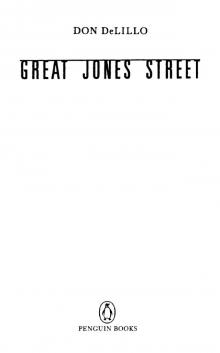 Great Jones Street (Contemporary American Fiction)
Great Jones Street (Contemporary American Fiction)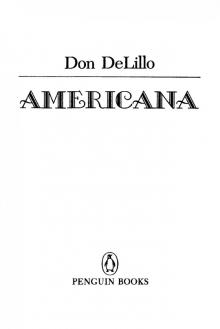 Americana
Americana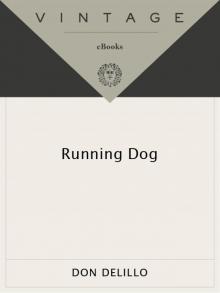 Running Dog
Running Dog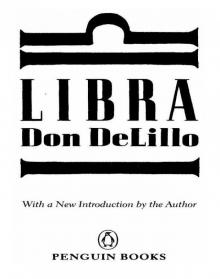 Libra
Libra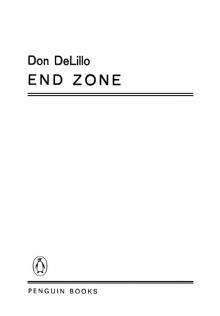 End Zone
End Zone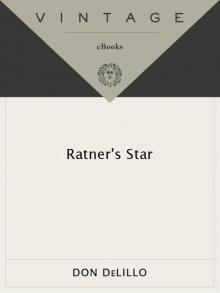 Ratner's Star
Ratner's Star Underworld
Underworld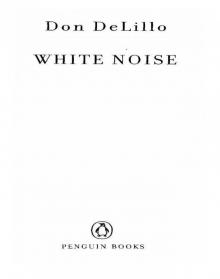 White Noise
White Noise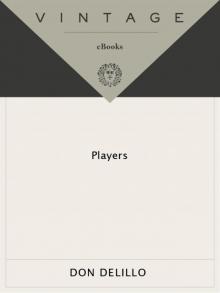 Players
Players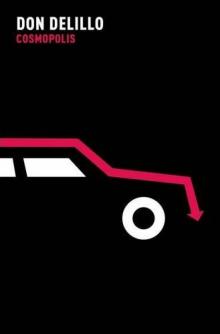 Cosmopolis
Cosmopolis The Silence
The Silence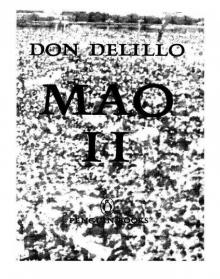 Mao II
Mao II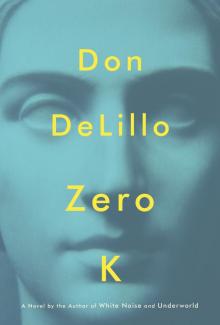 Zero K
Zero K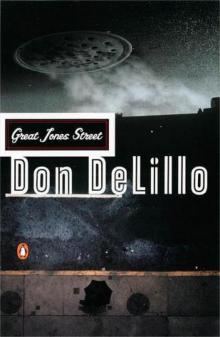 Great Jones Street
Great Jones Street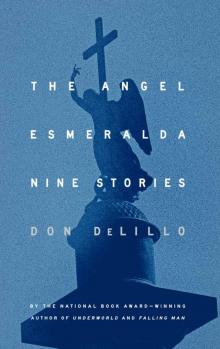 The Angel Esmeralda
The Angel Esmeralda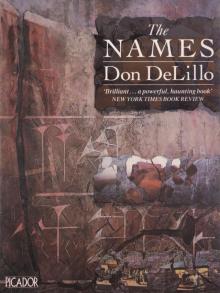 The Names
The Names The Body Artist
The Body Artist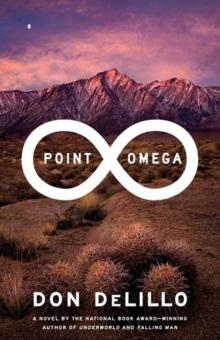 Point Omega
Point Omega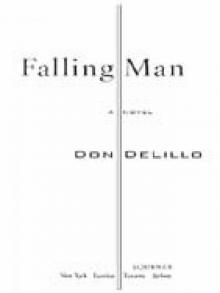 Falling Man
Falling Man